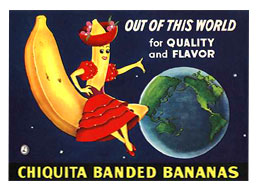Search
Democracy Links
Member's Off-site Blogs
big bananas .....

When the Honduran military overthrew the democratically elected government of Manuel Zelaya two weeks ago, there might have been a sigh of relief in the corporate boardrooms of Chiquita. Earlier this year, the Cincinnati-based fruit company joined Dole in criticizing the government in Tegucigalpa that had raised the minimum wage by 60%.
Chiquita complained that the new regulations would cut into company profits, requiring the firm to spend more on costs than in Costa Rica: 20 cents more to produce a crate of pineapple and 10 cents more to produce a crate of bananas to be exact. In all, Chiquita fretted that it would lose millions under Zelaya's labor reforms since the company produced around 8 million crates of pineapple and 22 million crates of bananas per year.
When the minimum wage decree came down, Chiquita sought help and appealed to the Honduran National Business Council, known by its Spanish acronym COHEP.
Like Chiquita, COHEP was unhappy about Zelaya's minimum wage measure. Amílcar Bulnes, the group's president, argued that if the government went forward with the minimum wage increase, employers would be forced to let workers go, thus increasing unemployment in the country. The most important business organization in Honduras, COHEP groups 60 trade associations and chambers of commerce representing every sector of the Honduran economy. According to its own Web site, COHEP is the political and technical arm of the Honduran private sector, supports trade agreements and provides "critical support for the democratic system."
Chiquita, formerly known as United Fruit Company and United Brands, has had a long and sordid political history in Central America. Led by Sam "The Banana Man" Zemurray, United Fruit got into the banana business at the turn of the 20th century. Zemurray once remarked famously, "In Honduras, a mule costs more than a member of parliament." By the 1920s, United Fruit controlled 650,000 acres of the best land in Honduras, almost one quarter of all the arable land in the country. What's more, the company controlled important roads and railways.
- By John Richardson at 19 Jul 2009 - 9:07am
- John Richardson's blog
- Login or register to post comments
Recent comments
11 hours 31 min ago
11 hours 34 min ago
12 hours 34 min ago
14 hours 38 min ago
15 hours 19 min ago
17 hours 43 min ago
19 hours 3 min ago
19 hours 10 min ago
1 day 3 hours ago
1 day 4 hours ago